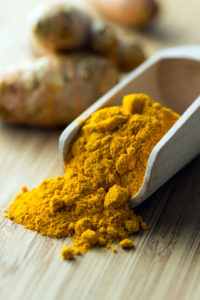
In the search for alternatives to help those patients who suffer from treatment-resistant depression, or who can’t tolerate the side effects of some antidepressant medications, a shining star rises — curcumin.
Curcumin is the potent anti-inflammatory ingredient found in the spice turmeric. The wonderful aromatic spice that makes mustard and curry yellow, turmeric is a delicious ingredient used in Indian and other eastern foods. Its flavorful qualities are second only to its healing characteristics.
Curcumin Protects Almost Every Part of Your Body
As a result, it provides anti-inflammatory benefits to nearly every part of the body. A single curcumin molecule possesses anti-inflammatory, antimicrobial, chemotherapeutic, anti-thrombotic, anti-hepatotoxic, antiparasitic, anti-diabetic, anti-psoriasis, and wound healing properties…but that just scratches the surface.
Today though, we’re focused on how it can help depression. And that brings into focus its neuroprotective properties…and…that it penetrates the blood-brain barrier carrying its healing properties to the brain. It’s also been discovered through animal studies that curcumin enhances neurogenesis in the adult hippocampus by proliferating the numbers of newly generated cells there.
Prevents Cell Death in the Hippocampus
by impeding reactive astrocyte expression, curcumin prevents cell death in the hippocampus.
Astrocytes are star-shaped brain cells located throughout the central nervous system, which provide support for neurons. In fact, they play a vital role in transmission of signals and communication along the central nervous system pathway. They control synapse formation, stabilization, and neurogenesis (making new nerve cells), as well.
But they also can react to perceived injuries in the CNS, and form scarring. When they do, they contribute to CNS disorders caused by the loss of normal astrocyte function. And that’s where curcumin comes in. Since curcumin throws up a roadblock to prevent the astrocytes from reacting to a perceived injury, which can result in cell death, the cells in the hippocampus can remain healthy and resilient.
In the last few years, studies that isolate and identify the specific powers of curcumin have become prolific. And each study strengthens the idea researchers have held, that curcumin has a long list of traits that bring healing to both the body and the mind.
Stimulates Neurogenesis
For example, curcumin has been found not only to be an effective antidepressant in lab studies (without the side effects often experienced with antidepressants), but it also enhances nerve growth in the frontal cortex and hippocampus. As an anti-inflammatory, it reduces the inflammation associated with depression which can affect all major organs, even the brain. When depression is chronic, inflammation becomes chronic too, and decreases serotonin and dopamine levels which in turn cause degeneration of specific brain regions.
As a neurogenesis agent, curcumin appears to restore neurotransmitters like serotonin and dopamine, and in doing so protects the brain. Since antidepressants often work to increase serotonin and dopamine, It’s not hard to see how restoration of these transmitters improves your mood.
A study published in the Journal of Affective Disorders in October 2014, showed 56 patients with Major Depressive Disorder who were given capsules filled with either curcumin or a placebo twice a day for 2 months. Up until the end of the fourth week, both groups displayed similar improvements in scores on the Inventory of Depressive Symptomatology (self-rated version IDS-SR30). However, from that point through the eighth week, a much greater difference was recorded between the curcumin group, and most significantly among patients with atypical depression.
Breaks the Inflammation Depression Cycle
Researchers are learning that as inflammation increases, it results in worsened depression, and…the converse is also true. Depression results in increased inflammation. So is this a chicken and egg question? The best answer at this point is maybe…but use of a powerful anti-inflammatory like curcumin can only help in the meantime.
At any rate, those with atypical depression stand to gain the greatest benefit from the anti-inflammatory properties of curcumin.
So let’s take it a step farther. Curcumin increases brain-derived neurotrophic factor (BDNF ). And a low BDNF level is believed to cause plenty of neurological disorders, not the least of which is major depression. People who are clinically depressed typically have severely low BDNF.
However, boost the BDNF and that person will experience an upbeat mood, feelings of well-being, and overall good mental health.
Happily, there’s even more benefit to a heightened BDNF level. More new neuronal cells are then generated, which helps to alleviate symptoms of depression.
We’ll talk about brain-derived neurotrophic factors on another day. But for today, remember that curcumin elevates BDNF, and your BDNF helps to alleviate symptoms of depression.
We’ve talked about a wide variety of ways curcumin, the active element in turmeric, helps your mood, your brain, and your body.
The recommended dosage for curcumin is 1g daily…divided into two doses. But curcumin is so safe, you could take 8 times as much without side effects.
The Catch: Poor Oral Bioavailability
So if curcumin is such a hero in healing and protecting your body and mind, why aren’t we all using it constantly? Well, there’s a big down side of curcumin we haven’t discussed, but it’s important. Taken alone, curcumin isn’t very easy to absorb. It’s difficult to get the benefits from it without a mitigating element added to the mix.
The good news is that studies have revealed a substance that greatly increases the bioavailability of curcumin. And that element is piperine, which is found in black pepper. What a lovely coincidence that black pepper and turmeric are often used together in the same dishes! So to get the benefit of your curcumin, always be sure to include some black pepper within a couple hours. Doing so increases your absorption of curcumin by as much as 2000%!
Even so, a therapeutic dose of of curcumin is 1 gram daily, (500 mg twice a day, at least!) which might be tough to ingest in a meal of curry. But that’s why we’re here.
This is one more consideration in a wide variety of therapies we explore with you in our office, with the goal of helping you live a more rewarding life. If you’d like to discuss curcumin and other treatment options that could improve your life and outlook, contact me here for an appointment.
Until we see you again, eat more curry!
To your ever-developing best self,
Lori Calabrese, MD

I’ve found that I can get significant amounts of turmeric along with the fats and piperine necessary to make it most effective into my diet daily by combining it with honey, black pepper, ginger, and coconut oil . I store this in a jar and spoon it into tea (Celestial Seasonings Honey Lemon Ginseng works well tastewise). I also add turmeric, pepper, and coconut oil to prepared soups like Cashew Carrot Ginger or creamy Tomato. It’s amazing how much turmeric you can get into the diet, relatively painlessly this way.
I have always taken Curcumin because it helps with my sinus congestion problems, and I have also noticed that it helps lift my mood and makes me feel well in general.